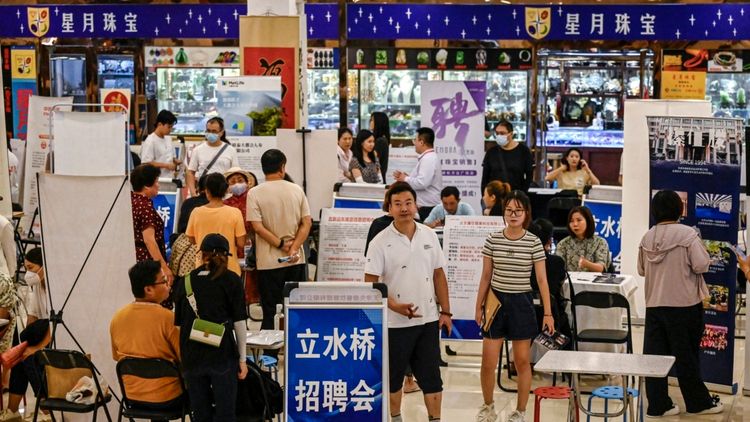Why is China's Economy Slowing Down? Could It Get Worse?

China's economic expansion is decelerating as decision makers strive to address a decline in the real estate market, which has been especially pronounced at the renowned developer, Country Garden. Worries are intensifying regarding whether the world's second-biggest economy is nearing a critical turning point.
What is the reason behind China's economic decline?
Contrary to individuals in the Western countries, Chinese citizens were mostly on their own during the COVID-19 crisis, and the anticipated extravagant spending surge, known as revenge spending, did not occur as speculated by some economists upon China's reopening.
Additionally, the desire for Chinese exports has been weakening as major trading allies have been struggling with the increasing costs of living.
As real estate makes up a significant portion of Chinese household wealth, a significant decline in this industry is impacting various sectors of the economy.
There have been significant worries regarding China's economy in the past. Does the current situation present a distinct scenario?
Concerns about the economy emerged during the worldwide financial crisis in 2008-09 and again in 2015 when there was a significant movement of capital out of the country. At that time, China restored trust by implementing a sudden increase in infrastructure investment and by promoting speculation in the real estate market, along with other actions.
However, the improvements in infrastructure have led to excessive debt, and the bursting of the housing market bubble now poses dangers to the stability of the financial sector.
With China's reliance on debt-driven investments in infrastructure and real estate sector reaching its peak and a decline in exports in tune with the global economic situation, China is left with only a single alternative to address its demand, which is household consumption.
In that context, this deceleration is distinct.
The revival of China's economy largely hinges on its ability to persuade households to increase their spending and decrease saving. This is especially crucial if consumer demand is to sufficiently offset the weaknesses observed in other sectors of the economy.
Why does it become an issue when there is a decrease in spending within households?
Prior to the onset of COVID, the proportion of household spending in relation to the total value of goods and services produced within a country (GDP) was one of the smallest globally. This was concerning to economists who recognized it as a significant underlying flaw in an economy overly dependent on investment supported by borrowed funds.
Economists point the finger at low consumer demand as the culprit behind the lack of interest in investing within the private sector and as the reason for China's descent into deflation in July. If this situation continues, deflation could worsen the economic decline and further compound debt issues.
The disparity between spending and investing is more profound compared to Japan's condition prior to experiencing a period of economic stagnation in the 1990s, famously known as the "lost decade."
Is China's economic slowdown poised to deteriorate further?
Some experts are concerned that China may find it challenging to achieve its economic growth goal of approximately 5% for 2023 due to underwhelming data readings. They suggest that without increased government expenditure, accomplishing the target could be problematic.
Approximately 5% is still a significantly greater increase compared to what numerous other significant economies will attain. However, experts argue that it is a discouraging number for an economy that invests approximately 40% of its GDP annually, which is roughly twice the amount invested by the United States.
Furthermore, the government's inclination towards substantial financial encouragement remains ambiguous in light of the substantial municipal debt.
Worries regarding the decline in growth are exacerbated by the intense pressure in the real estate industry - a sector that contributes approximately 25% to the overall economic activity. This poses a significant challenge to policymakers, highlighting doubts about their capacity to effectively reverse this downward trend.
A few economic experts caution that investors need to adapt to significantly decreased growth. A small number among them even suggest the possibility of experiencing a stagnation similar to that of Japan.
However, some economic experts argue that numerous individuals and small enterprises might already be experiencing a level of economic hardship comparable to that of a recession. This is attributed to the fact that youth unemployment rates exceed 21% and there are deflationary forces exerting pressure on profit margins.
Can interest rate reductions be beneficial?
On Friday, prominent Chinese banks decreased the interest rates on several yuan deposits in order to alleviate the strain on their profit margins. This move also allows them flexibility in lowering lending expenses for borrowers, including reducing mortgage rates.
Whilst policymakers anticipate that reducing interest rates would stimulate spending, economists caution that the reduction in deposit rates associated with this measure leads to a shift of funds from savers to borrowers. A more substantial and lasting impact would be achieved by transferring resources from the government to households.
Rate reductions can potentially result in the devaluation of the yuan and the outflow of capital, both of which China would prefer to prevent.
The People's Bank of China announced on Friday its decision to reduce the mandatory reserve requirements for financial institutions regarding foreign currency holdings. This move aims to alleviate the strain on the yuan.
What else is within the realm of China's government capabilities?
Economists are desiring policies that would enhance the portion of GDP attributed to household consumption.
There are various choices available to address these concerns, such as consumer vouchers funded by the government, substantial reductions in taxes, promoting a quicker increase in wages, establishing a safety net that includes more generous pensions and improved unemployment benefits, as well as enhancing the accessibility and quality of public services.
There were no indications of any measures being highlighted during a recent gathering of Communist Party leaders. However, economists are eagerly awaiting a significant party conference in December, hoping for substantial and transformative changes to the system.









































